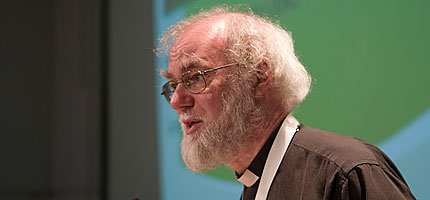The Archbishop of Canterbury Dr Rowan Williams addresses the Lutheran World Federation (LWF) Eleventh Assembly theme, "Give Us Today Our Daily Bread," in his 22 July keynote address at the LWF's 20-27 July 2010 gathering in Stuttgart, Germany. © LWF/Erick Coll
22.07.2010
“Give Us Today Our Daily Bread” is a Petition Also for “Tomorrow’s Bread”: Archbishop of Canterbury
Dr Rowan Williams Says the Prayer Asks for Christ to be Our Food and Sustenance
STUTTGART, Germany, 22 July 2010 – The petition “Give Us Today Our Daily Bread” is not only asking God to provide today’s bread but also tomorrow’s bread, the Archbishop of Canterbury The Most Revd Dr Rowan Williams said today in his keynote address to the Eleventh Assembly of the Lutheran World Federation (LWF). “The need, the hunger, we must learn to express is a need not simply for sustenance but for God’s future. What we need is the new creation, the bread that comes down from heaven and gives life to the world.”
Exploring this theme of “tomorrow’s bread” further, the head of the Anglican Communion said that “Give Us Today Our Daily Bread” is “a prayer than inevitably looks beyond the present moment and the settling of immediate needs … It is as if in order to live in peace and hope today, we have to ask for that foretaste or ‘advance payment’ of God’s future.” He said that every petition in the Lord’s Prayer is implicitly a prayer for the coming of the Spirit, “and this one is no exception.”
The Archbishop said that praying for the Spirit “is indeed praying for the grace to receive our humanity from God at each other’s hands in the reality of communion”, noting that this often involves struggle, “since we cannot remain content with our images of each other. Becoming bread for each other means breaking the stony idols of ourselves and of the other.”
He told the Assembly that people recognized human dignity in one another by sharing the truth of what humanity is in the eyes of God. “We feed each other by honoring the truth of the divine image in each other,” he said.
Thus “Give Us Today Our Daily Bread” is a petition for all humanity, Williams said. The prayer “both challenges the arrogance of those who think they are not in need and establishes that the needy are fully possessed of a treasure that needs to be uncovered and released.” The prayer keeps us awake to what we owe to our neighbour as a gift; “their humanity depends on ours, as ours does on theirs.” It is irrational to pray for our daily bread while at the same time seeking to hold on to it at the expense of others in one way or another, he said.
In the fourth petition “we are praying for grace to receive our own humanity as a gift as well as asking for openness and gratefulness to whosoever and whatever awakens us to our dignity.” He explained that while our dignity was primarily given during creation, it was always in need of being called into active life through relationships, by the gift of others.”
Williams said that in the petition we ask God to sustain in us the sense of our humanity in its fullness and its richness; “to give us those relations with other human beings that will keep us human, aware of our morality and our need, yet confident that we are loved.”
Daily bread is the bread of truth, he said, which is also the bread of honesty about ourselves. So when we pray for our daily bread, “we pray also for awareness of our failure, and – hard as this always is – for the grace to hear the truth about it from one another, and also from the wider world.” He said that God also acts to nourish our humanity by the challenges, questions and rebukes that the rest of the human race puts to the Church.
“Give Us Today Our Daily Bread” is thus a prayer for the fullness of the Church to be made manifest in a pattern of recognizing our own need and our neighbor’s, the Archbishop said, “and to turn with confidence to each other so that the need may be met.”
The prayer is, simply, “for Christ to be our food and sustenance, so that all self-sufficient pride, all individual anxiety and defensiveness, all greedy effort to live at the expense of the neighbor are overcome.”
(665 words)
Keynote Archbishop of Canterbury

